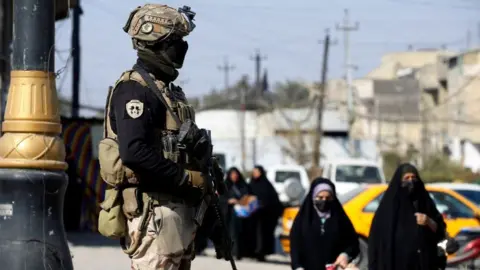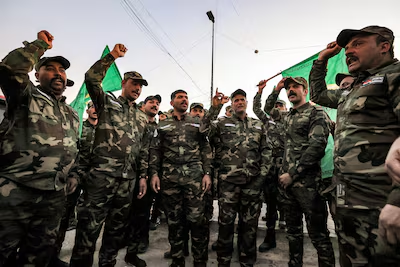Introduction
Baghdad clashes police Iran-backed militias erupted violently on July 27, 2025, in the Karkh district of Baghdad. The deadly confrontation involved Iraqi federal police and fighters from the Popular Mobilization Forces (PMF), an umbrella group of Shiite paramilitary factions, many of which are Iran-backed. At least one police officer was killed, several others wounded, and a civilian lost their life during the firefight. This incident highlights the ongoing security challenges in Iraq and the complex role of Iran-backed militias within the country’s borders.
Background
The PMF was established in 2014 to combat the Islamic State (ISIS) and was later integrated into Iraq’s state security forces. While officially under the control of the Iraqi military, many PMF factions maintain close ties to Iran and operate with significant autonomy. This dual loyalty has led to tensions between the Iraqi government and the militias, particularly when their actions conflict with state policies.
The Incident
The clash occurred when fighters affiliated with Kataib Hezbollah, a prominent Iran-backed militia within the PMF, stormed a Ministry of Agriculture building in Baghdad’s Karkh district. The fighters aimed to prevent the appointment of a new director, seeking to reinstate a former official who had been dismissed due to corruption allegations. The situation escalated when federal police responded to the scene and came under direct fire from the militants. The ensuing gunfight resulted in the death of one police officer and injuries to several others, including civilians caught in the crossfire.
Casualties and Arrests
According to hospital and police officials, at least one police officer was killed, and nine others were wounded in the clash. A civilian, identified as a taxi driver, was also killed during the exchange of fire. Security forces arrested 14 PMF fighters involved in the incident, who were subsequently referred to the judiciary for legal proceedings. An anonymous source within Kataib Hezbollah confirmed that one fighter was killed and six others were wounded, adding that the group “does not want to escalate” the situation.

Government Response
Iraqi Prime Minister Mohammed Shia al-Sudani condemned the attack and ordered an immediate investigation into the incident. He emphasized that no entity is above the law and that those responsible would be held accountable. The Joint Operations Command, which reports directly to the Prime Minister, confirmed that the detainees were PMF members and had been referred to the judiciary. The Prime Minister also ordered the formation of a committee to investigate the incident and assess the security situation in the Karkh district.
Reactions from Kataib Hezbollah
In response to the government’s actions, a member of Kataib Hezbollah stated that the group does not seek to escalate the situation and will allow the judiciary to take its course. The group also expressed concerns about the treatment of its detained members, alleging that they were subjected to severe torture by Iraqi security forces. These claims have further complicated the already tense relationship between the Iraqi government and Iran-backed militias operating within the country.
Broader Implications
The July 27 clashes highlight the ongoing challenges faced by the Iraqi government in asserting control over armed groups operating within its borders. Despite efforts to integrate the PMF into the state security apparatus, many factions continue to operate with significant autonomy and maintain strong ties to Iran. This dual loyalty has led to instances where the actions of these militias conflict with state policies, creating tensions between the Iraqi government and Iran-backed groups.
Public Reaction
The incident has sparked public outrage, with many Iraqis condemning the actions of the militias and calling for greater government control over armed groups. Citizens have expressed concerns about the erosion of state authority and the increasing influence of Iran-backed militias in Iraq’s political and security landscape. The government’s response to the incident will be closely scrutinized, as it may set a precedent for how future clashes between state forces and Iran-backed militias are handled.
Conclusion
The clashes between Iraqi police and Iran-backed militias in Baghdad underscore the complex security dynamics in Iraq. While the government has taken steps to address the incident and hold those responsible accountable, the broader issue of militia influence remains a significant challenge. The outcome of the government’s investigation and subsequent actions will be crucial in determining the future balance of power between the Iraqi state and Iran-backed armed groups operating within the country.
Do follow us: Instagram
Read More: Kate Middleton to Play Key Role in Emir of Qatar’s State Visit to the UK



